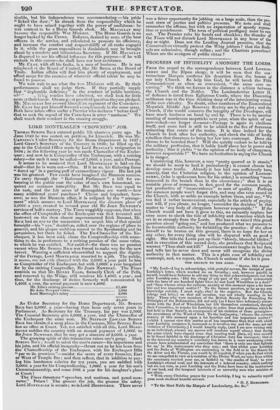LORD MONTEAGLE'S "CROWNING" JOB.
'THOMAS SPRING RICE entered public life nineteen years ago. In Jtine 1820 he was seated, on petition, for Limerick. He was Mr. CANNING'S Under Seeretery for the Home Department in 1827; Lord GREY'S Secretary of' the Treasury in 1830; he filled up the gap in the Colonial Office made by Lord STANLEY'S resignation in 1834; in the following year he was made Chancellor of the Exche- quer; and now he is Comptroller of the Exchequer, with a retiring salary—for such it may be called—of 2,000/. a year, and a Peerage. It seems to be assumed that Lord MONTEAGLE is laid on the shelf—that he is worn out—effete. If it be so, his flickering flame "flared up" in a parting puff of' v vigour. His last job was his greatest. Few could have imagined the Shannon success. To carry through the " Reformed Parliament" a bill for en- hancing at the public cost the value of one's own homestead, re- quired BO common intrepidity. But Mr. RICE was equal to the task, and the fair acres of Shanagolden are worth—how many additional years' purchase? Clever and impudent, how- ever, as was the Shannon affair, it is eclipsed by the " arrange- ment " which secures to Lord MONTEAGLE the sinecure place of 2,000/. a year, created to reward poor old Sir JOHN NEWPORT'S services of belle century. The Times waggishly supposes, that when the office of Comptroller of the Exchequer was first invented and bestowed on the then almost superannuated Irish Baronet, Mr. RICE had an eve to the succession : we acquit him of that special foresight—his." eye," doubtless, rolled over the regions of place in general, and his proper ambition soared to the Speakership and its perquisites, but there he failed. The Ex-Chancellor of the Ex- chequer, it has been said, chose the Comptrollership with some- thing to do, in preference to a retiring pension of the same value, to which be was entitled. Not entitled—for there was no pension vacant when Mr. SPRING RICE was forced to make way for the new brevet. 'Wanting a sufficient wherewithal to support the dignity of the Peerage, Lord MONTEAGLE resorted to a job. The public, it seems, are not only charged with the 2,000/. a year paid to him as Comptroller of the Exchequer, but with 1,000/. a year bargained for by the retiring Comptroller Sir JOHN NEWPORT. The Times
reminds us that Mr. Her iss l'Ams, formerly Clerk of the Polls, and removed by the Whigs, still receives his 1,4001. a year; and thus, for the discharge of duties formerly well remunerated by 1,400/. a year, the actual payment is now 4,400/.
Mr. Ellis's retiring pension £1,400 Sir John Newport's ditto 1,000 Lora Monteagle's salary '3,000
.£-1,400
As Under Secretary for the Home Department, Mr. SPRING RICE had 2,000/. a year—having then been only seven years in Parliament. As Secretary for the Treasury, his pay was 2,500/. The Colonial Secretary gets 5,000/. a year, and the Chancellor of' the Exchequer the same sum. Mr. STEPHEN EDWARD SPRING RICE has obtained a snug place in the Customs, Miss SPEING RICE has an office at Court. Yet, not satisfied with all this, Lord MONT- EAGLE saddles the country with an annual payment of 1,000/. to Sir JOHN NEWPORT, that he may get a sinecure of 2,0001. a year. The grasping spirit of this transaction raises one's gorge. Mark SPRING Rica; recall to mind the man's career—his impudence and his jobs, and his official incapacity—thrust out as he has been from the Chancellorship of the Exchequer, with his Exchequer Bills "par to 2s. premium "—amidst the scorn of every financier, East or West of Temple Bar; and then reflect, that in addition to pay- ing him handsome salaries for ten years you are saddled with 3,000/. a year for his Comptrollership, 1,000/. a year for his son's Commissionership, and some 500/. a year for his daughter's place at Court !
The Times threatens "speeches, and motions, and penal mea- sures." Pshaw I The grosser the job, the greater the safety. Lord Moasre,suez is secure; so is Lord MELBOURNE. There never was a fairer opportunity for jobbing on a large scale, than the pre. sent state of parties and politics presents. We note and shall remember the offence, but with no expectation of speedy repars. tion or punishment. The term of political profligacy must be run out. The Premier rubs his hands and chuckles; the thunder of the Times will not disturb Lord MONTEAGLE in any hour of the (lay or night. Does not the Leading Journal perceive, that the Conservatives virtually protect the Whig jobbers ? that the Radi. cals are submissive, though sullen ; and the Chartists powerless? Where are the avengers of public virtue ?


























 Previous page
Previous page